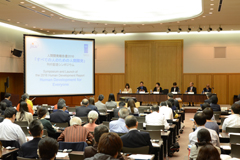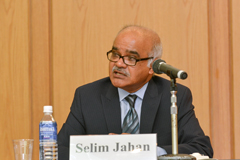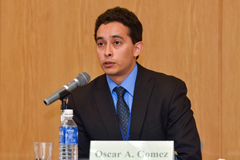Launching the 2016 Human Development Report “Human Development for Everyone” at UNDP–JICA-RI Joint Symposium
2017.06.05
Despite significant progress in human development over the past quarter-century, millions of people still suffer from deprivation and discrimination. Who has been left behind and why?
These questions are raised in the 2016 Human Development Report “Human Development for Everyone,” issued by the United Nations Development Programme (UNDP) in March 2017. To celebrate the launch of this report, the UNDP and the JICA Research Institute (JICA-RI) co-hosted a symposium at the JICA Ichigaya Building in Tokyo on May 18th and discussed how the fruits of human development can be extended to those who are left behind.

A large audience participated in the UNDP-JICA-RI joint symposium
Tetsuo Kondo, Director of the UNDP Representative Office in Japan, delivered the opening remarks, introducing the keynote speaker—Selim Jahan, Director of the Human Development Report Office in UNDP New York—and the panelists: Robert D. Watkins, UN Resident Coordinator and UNDP Resident Representative in Bangladesh; Yasushi Katsuma, professor at the Graduate School of Asia-Pacific Studies, Waseda University, and Advisory Panel Member of the Human Development Report, UNDP; Akiko Mera, International Program Manager of Hunger Free World; and Oscar A. Gomez, Research Fellow at JICA-RI.
Jahan gave an overview of the report in his keynote speech. He stated that the principle of universalism is at the core of the human development approach and elaborated on the five basic messages of the report. First, impressive progress has been achieved in human development; yet, some deprivations persist. Second, in every society, there are specific groups, particularly women and girls, who are systematically discriminated against and deprived as a result of factors such as discriminative laws, social norms, and exclusion. Third, we need the assessment perspectives focusing on a disaggregated framework to obtain a complete picture of a society, determine the quality and quantity of human development needs, and explore new sources of data and ways to take advantage of the data revolution. Fourth, national policies play an important role in ensuring human development for everyone and need to be supplemented by reforms at the global level. Lastly, the human development framework and the 2030 Agenda for Sustainable Development are mutually reinforcing.

Selim Jahan, Director of the Human Development Report Office in UNDP
Subsequently, each panelist gave brief presentations, facilitated by Ako Muto, Senior Research Fellow at JICA-RI.
Watkins, the first panelist, discussed the underlying challenges faced by many indigenous people who remain excluded from the benefits of human development. He did so by sharing his experiences in the Chittagong Hill Tracts region in Bangladesh.
Katsuma discussed global health governance, taking up the recent Ebola outbreak, which posed challenges in terms of the Means of Implementation (Mol). He proposed that challenges such as financing for preparedness, emergency response, and coordination among international organizations should be addressed.
Mera gave insights into the report from the NGO perspective. She pointed out that the report did not comprehensively cover global issues such as social instability, youth unemployment, and the water crisis. She indicated that bottom–up empowerment is an important aspect in addressing such global challenges. She suggested that the following areas should be looked into further: identifying who is the furthest behind, determining the side effects of economic growth, and defining the roles of governments and NGOs in achieving human development.
Lastly, Gomez gave his views from the human security perspective: 1) human development can help counter bias of attention generated by reaction to shocks, which is important for coming up with strategies to empower population groups; 2) embracing and internalizing a culture of prevention against threats is needed through human development promotion; and 3) it is noteworthy that although the report puts emphasis on national policies necessary to advance human development and simultaneously makes an effort to describe transforming global governance systems, much more is left to be done, particularly about the latter.

Oscar A. Gomez, Research Fellow at JICA-RI, gave his views
Some of his observations were previously published as a think piece for the 2016 Human Development Report “Sharing the journey: the way ahead for human development and human security frameworks,” authored by Gomez, Muto, and Sachiko G. Kamidohzono.
Following the panel discussion, the Q&A session took place. Multiple comments were shared and various questions were posed by the audience on topics such as the methodology to identify those who are left behind, the Human Development Indicator (HDI) ranking in the report, people with multiple vulnerabilities who are not captured by the HDI, further clarification on the definition of universalism, “who” excluded those vulnerable people, and the technological gap African countries faced during the Ebola outbreak.
Nobuko Kayashima, Deputy Director of JICA-RI, delivered the closing remarks, expressing her gratitude for the fruitful discussions. She stated that it is important to reflect on what we can do for “human development for everyone” in the world today, where two different streams—universalism and growing anti-globalism—exist.
<External link>
"2016 Human Development Report - Human Development for Everyone" by Selim Jahan (May 18, 2017)
(YouTube:JICA Research Institute Official Channel)

事業事前評価表(地球規模課題対応国際科学技術協力(SATREPS)).国際協力機構 地球環境部 . 防災第一チーム. 1.案件名.国 名: フィリピン共和国.

事業事前評価表(地球規模課題対応国際科学技術協力(SATREPS)).国際協力機構 地球環境部 . 防災第一チーム. 1.案件名.国 名: フィリピン共和国.

事業事前評価表(地球規模課題対応国際科学技術協力(SATREPS)).国際協力機構 地球環境部 . 防災第一チーム. 1.案件名.国 名: フィリピン共和国.

事業事前評価表(地球規模課題対応国際科学技術協力(SATREPS)).国際協力機構 地球環境部 . 防災第一チーム. 1.案件名.国 名: フィリピン共和国.

事業事前評価表(地球規模課題対応国際科学技術協力(SATREPS)).国際協力機構 地球環境部 . 防災第一チーム. 1.案件名.国 名: フィリピン共和国.
scroll